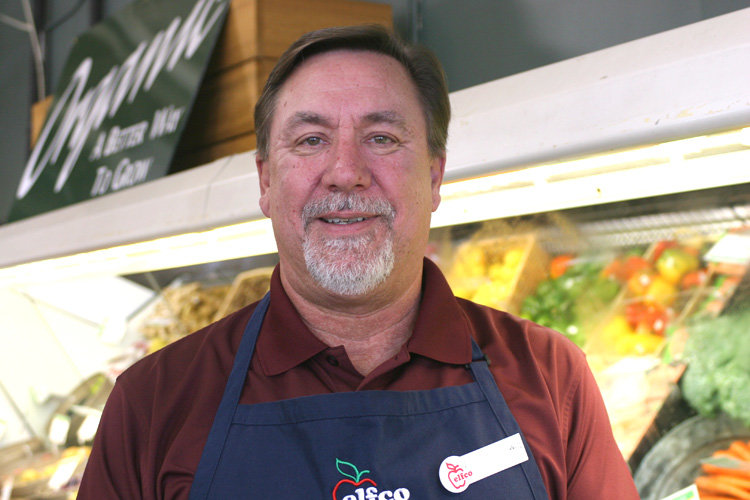
“Sales are down 25 percent over the last year,” said Bruce Grambau, ELFCO’s general manager. “We are also down 20 percent in customers. We used to have 1,100-1,200 customers per week, now we’re at 800-900.”
Anne Woiwode, who leads the ELFCO board, blamed the financial problems on local competition from Whole Foods, Fresh Thyme and Foods for Living and the cooperative’s low profile.
“We’re clearly are in a competitive environment. ELFCO happens to be the closest food co-op to Whole Foods, so that has had an impact,” Woiwode said. “We realize advertising is extremely important, but we’re not in a position to compete with the kind of advertising that is done by the large stores that don’t have the specific niche we fill.”
The co-op is in a building it owns at 4960 Northwind Drive in East Lansing, just one-tenth of a mile from Whole Foods and not much farther from Foods for Living.
Woiwode said the niche is a big one, but the co-op has failed to communicate that to the public.
“ELFCO is similar to what a lot of people in this country are looking for: a non-corporate way to support the community and provide the food and necessities that it needs,” Woiwode said. “People talk crowd funding, and that’s really what a co-op is. So we’re trying to reach out to folks to make sure they understand that.”
The biggest miscommunication is over equity, or the cost of becoming a co-owner. The perception is that the store is a “buyers club,” a place where only owners can shop. In fact, anyone can shop at ELFCO.
“To be an owner it’s a $60 fee,” said Shiloh Daum, ELFCO’s outreach coordinator. “Pay it one time, and with ownership comes the 10 percent discount once a month and voting rights.”
Those voting rights are largely what differentiate the co-op from the average grocery store. Any of the roughly 1,800 owners can vote to elect the cooperative’s board, which decides on everything from stocked products, suppliers and profit distribution.
“(The equity) is an investment. If we are making a significant profit, it doesn’t go to some unknown place,” Woiwode said. “It goes either back into the store itself or other activities of ELFCO like community outreach or engagement or supporting local good works of some sort.”
That “triple bottom line” mindfulness is what drew Paulette Stenzel, an MSU professor of sustainability and international business law, to become an owner. Stenzel specializes in “grassroots tools” for sustainable development like co-ops, fair trade, organics and microfinance. They are tools that she said ELFCO uses with local farmers.
“It’s truly local production. It’s straight from the farmer to the shelf to us. It’s all organic so we don’t have to worry about the pesticides, and we don’t have to worry about the farmers who produced it being exposed to hazardous chemicals,” Stenzel said.
Good practices aside, much of the eastside community simply does not utilize the co-op.
“When we started, ELFCO was the only place in the mid-Michigan area where you could find things like whole grain flour, rolled oats or organic products,” Woiwode said. “That’s sort of hard to believe, but it’s true. It was formed to fill a need that was entirely unmet. Today, you can find those in almost every grocery store in our area.”
David Finet, ELFCO’s previous general manager, said that competition today significantly outweighs anything in the cooperative’s history.
“I think it is vitally important that the co-op organization not lose the building if they are unable to maintain operations as a storefront,” Finet said. “One option for ELFCO to survive, if current operations don’t become feasible very soon, is to cease retail operation with enough money to be able to keep the building, then rent the current store space.”
The proposition might seem drastic, but to adapt to the current market, ELFCO may have no choice other than to scale down its operation and hope for a return in the future.
“Our average shopping basket is in the vicinity of $25. We need to basically double that,” Daum said.
Daum has turned to a social media campaign to help become a “better community participant,” bringing “transparency” to the public about ELFCO’s financial issues. Signs bearing the #saveyourcoop hashtag are being used to bring potential shoppers into the store.
“We put clues on Facebook to tell you where they are, and you take a selfie with the sign, post it on social media, and if you do that you get to come in and have a Zingerman’s brownie, free on us,” Daum said.
For now, ELFCO’s situation remains critical, but Daum holds out hope.
“We don’t have to close, and we really don’t want to. We need help, we need the community to rally behind us for support,” Daum said. “We really want to give these outreach efforts a chance. I’m holding out hope, and that gives me passion to continue with every breath I have.”
Support City Pulse - Donate Today!
Comments
No comments on this item Please log in to comment by clicking here